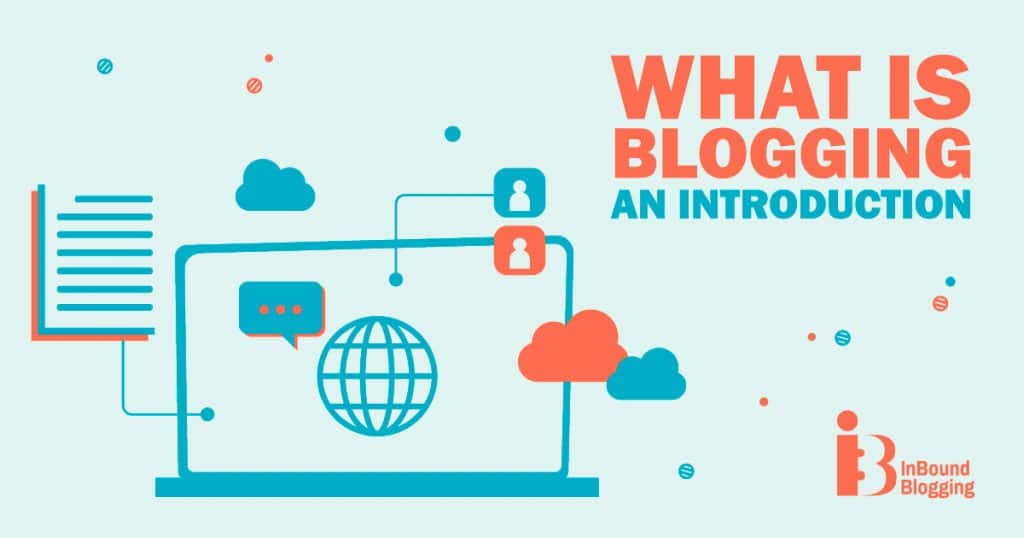Playback speed:
What is blogging and why is it so popular among today’s brands? Even if you’re not sure what the word “blog” stands for, you’ve probably interacted with one before. In fact, if you’re reading this article right now, you’re consuming blog content.
Blogging started life as a way for people to share their thoughts, insights, and opinions on the internet. Virtually anyone can start and publish a blog, using common tools like WordPress or Wix. Furthermore, it’s also one of the most effective ways to generate attention for a brand.
68.5% of people say adding a blog to a website increases the credibility of the company, and 71% of B2B buyers read blog content regularly during the buyer journey. With blogs, organizations can demonstrate thought leadership, educate their audience, promote their products, and even strengthen their position on search engine result pages.
What Is Blogging? An Introduction

So, what is blogging, and what is a blogging strategy?
Blogging refers to the process of writing and publishing content on a website or web page. When “blogging” marketers and individuals combine text, photos, and other assets into an online document users can access for educational, or entertainment purposes.
The term comes from the word “blog”, which is actually a shortened version of “weblog”, a tool which allowed early internet users to log the details of their lives in digital diary entries. Most website building tools and applications come with solutions specifically designed to help users not only write blogs but publish and optimize them according to SEO (Search Engine Optimization) standards.
What Is a Blog Post?
Now you know what blogging is, you might be wondering what a blog post looks like. A blog post is an individual page on your website which focuses on covering information about a specific topic. For instance, if your company shares information about content marketing, you might write a blog about how long a piece of content should be to rank for SEO.
Blog posts help companies rank on search engine result pages for a range of keywords. Each post generally has its own “target keyword”, as well as supplementary terms it might want to rank for. When Google crawls a website, it takes note of these blog posts to determine which information it can serve to potential searchers.
Blog posts can also help to improve your site’s internal linking structure. You can connect related blogs to each other using hyperlinks to make it easier for customers and readers to navigate your site and consume useful information.
What Is the Purpose of a Blog?
Originally, blogging was introduced as a tool to allow anyone to share their thoughts and feelings online. It was a popular way of connecting with others through the internet, even in the early days of the web. Over the years, blogs have become an invaluable tool for businesses, allowing them to create pages capable of capturing the attention of Google with specific keywords.
Blogs allow companies to publish “thought leadership” content, articles, and other information on their website for customers to read. Many entrepreneurs, professionals, and businesses have their own blogs, where they can talk about topics relevant to their industry and consumers.
Notably, there are many different styles of blogs. For instance, a “lifestyle blog” is an excellent solution designed to provide users with tips and insights connected to various parts of their lives. Writers might publish content related to travel, home design, health, and beauty. A “company blog” on the other hand is something published by a business to help promote an organization.
Blogging for business is incredibly beneficial, even highly recommended. Company blogs can include informational and how-to content, but they also focus on highlighting the features and valuable components of their products and services. The most common uses for blogs include:
- Helping companies and individuals to rank on search engine pages
- Sharing information about a specific topic and showing expertise
- Attracting visitors to websites so they can be turned into leads
- Engaging with and building an online community for a brand
Who Is a Blogger?
Anyone can be a blogger, provided they have access to a website with a blog. Essentially, a blogger is someone who writes content for marketing or personal purposes, which is then shared online. Bloggers can be professionals who work on behalf of businesses to share valuable information about the company for promotional purposes.
There are also bloggers who are considered influencers or thought leaders in their field, who share their own personal knowledge, without a focus on promoting a specific brand. Freelance bloggers have also become particularly popular in recent years. These individuals create blogs for a wide range of agencies and customers.
Can You Make Money Blogging?
Starting a blog, whether it’s a personal blog, a food blog, or a blog for business purposes, often sparks the question: Can you turn your passion into a source of income? The answer is a resounding yes!
First and foremost, to make money blogging, driving traffic to your blog is essential. The more eyes you have on your content, the greater your potential income through advertisements and affiliate marketing.
One of the most common methods to monetize a blog is through affiliate marketing. This strategy involves promoting products or services that align with your blog content. Each time a reader makes a purchase through the affiliate links on your blog, you earn a commission.
Another way to generate income is through blog advertising and sponsored posts. As your blog gains traction and attracts a consistent flow of visitors, advertisers may be keen to collaborate with you to reach your audience.
As you can see, blogging offers not just a platform for sharing ideas but also an opportunity to create a sustainable income stream. However, the key to success is finding a balance between delivering valuable content to your target audience and incorporating monetization strategies.
What Are the Pros and Cons of Blogging
Blogging is commonplace in today’s business world. Around 91% of B2B marketers say their organizations use blogging and content marketing, while 86% of B2C marketers say the same. Blogging can bring a wealth of benefits when used correctly, from enhancing your SEO standing, to strengthening relationships with customers.
Here are the Pros and Cons of blogging.
Pros:
- Improved SEO: Most online interactions in today’s world start with a search on a platform like Google. To ensure you can connect with your target audience, you need to ensure your pages appear on the first page of Google’s search results. This requires the use of blog content primed with SEO components, such as keywords, and links. Search engines love new content, so the more blogs you produce, the more you’re likely to rank.
- Customer engagement: Blogging started as a way for people to engage followers with stories about themselves. Now, it helps businesses to communicate with customers in a way that strengthens relationships and rapport. Blog posts can keep consumers up-to-date on what’s happening within your company, and provide them with useful information, which improves their perception of your brand.
- Income opportunities: Individuals can use blogs as a way of securing an additional source of income. Affiliate marketing strategies and ads on a blog can generate money for publishers. Additionally, professional bloggers can sell their services to agencies and companies on a freelance basis. Some people are even paid to create guest posts.
- Thought leadership: Blogging can be an excellent way to demonstrate the expertise and knowledge of an individual or brand. By sharing useful details about a crucial topic, a company can highlight its value to its target audience, and differentiate itself from the competition. Blogs can also be a good way to strengthen brand authority.
- Organic growth: Blogs allow companies to grow their presence online organically, without having to rely on paid advertisements and promotions. The more you blog, the more your presence grows naturally, leading to an excellent return on investment. Blogs also require very little initial investment for most companies and individuals, so they’re considered a cost-effective strategy for growth.
Cons:
- Time-consuming: Successful blogs need to be well-written, researched, and engaging. Unfortunately, this requires a lot of time and effort on behalf of bloggers. At the same time, companies generally need to create posts on a consistent blogging schedule, so they can continue to drive people back to their website as often as possible.
- Creative demand: Blogging requires that people constantly come up with new and fresh ideas so they can engage with their audience. You can’t just copy what someone else is saying online and expect to achieve results. Generating topics for new blog posts can be a complex process, and may take a lot of a company’s resources.
- Slow payoff: Blogs don’t always generate results for a brand or company straight away. It takes time for a post to be ranked by search engines, and begin generating attention for an organization. This means you may not get a return on your investment until months after you’ve already published something.
Key Things Bloggers Need to Know

While anyone can start a blog and begin publishing content, this doesn’t necessarily guarantee that the blog will be successful. Producing an effective blog takes time, commitment, and effort. Here are some key things bloggers need to consider in order to thrive:
- Always have a calendar: Creating a content calendar is often important for blog owners, as it helps to ensure they’re frequently publishing fresh pieces for their audience to enjoy. You can determine how frequently you need to publish new blogs by checking other competing brands’ patterns in your industry.
- Assess the competition: Take the time to check out the blogs being produced by competing brands for insights into the kind of content you should be writing. You can use these blogs for inspiration, as well as to look for “content gaps” for topics they haven’t covered.
- Know your audience: Make sure you know who you’re writing for. Create a user persona with demographic information and behavioral insights into the people you most want to read your blogs. This will help to ensure you’re answering questions they care about, and speaking the right language.
- Explore monetization opportunities: If you want to grow your blog and make money blogging, you’ll need to explore a range of options. You might decide to include ads on your website, or you could work with a company to refer consumers to their website.
- Learn about SEO: Blogs need to be able to appeal to both human readers and search engines. Learning about the basics of SEO, such as how to use keywords and links, should improve your blog’s ranking potential, and generate more opportunities.
- Use various blog styles: Explore different styles of content to connect with various audience members. You could write list-based blogs, how-to posts, and thought leadership content. You could even combine your blogs with videos and infographics.
- Update old content: Remember to regularly go back to your old blogs and update them with new and fresh information, so they can continue to attract new customers. You might even be able to repurpose some of your old blogs into new YouTube videos, eBooks, and articles.
Is Blogging Right for You?
Whether you’re a freelancer looking for a new source of income, someone who wants to share their expertise online, or a business searching for growth, blogging could be an excellent tool. It’s a phenomenal way to draw attention to your website and start building lucrative relationships with the people most likely to support your business.
Don’t underestimate the power of blogging.
FAQ
What is the difference between a blog and a website?
The main difference between a blog and a website is that a blog is regularly updated with new content in chronological order, while a website is a collection of static pages that provide information about a particular topic or business.
What do you need to start a blog?
To start blogging, you need to decide on a topic or niche, pick a domain name for your blog, and sign up for web hosting or a free blogging platform like WordPress, Blogger, or Medium.
How much does it cost to start a blog?
The cost of starting a blog can vary. You can start for free on some platforms, but for a self-hosted blog, it may cost around $50 to $100 per year for domain and hosting.
What is a blogging platform?
If you want to create a blog, you must first choose a blogging method and platform. A blogging platform is a software or service that allows you to create and manage your blog posts. It provides you with the tools and features necessary for publishing and organizing your content.
How can I make my blog successful?
To have a successful blog, you need to consistently create high-quality and engaging content. Other than that, you should promote your blog through various channels such as social media platforms, and interact with your readers. Launching a newsletter, displaying ads, and setting up affiliate links are other fundamentals for a successful blog.
How can I make my blog look appealing?
You can make your blog look better by choosing a visually appealing blog template or theme. Depending on the hosting platform you’re using, you can customize the colors, fonts, and design elements to match your brand or personal style. Additionally, use high-quality images and include multimedia elements like videos or infographics to enhance the visual appeal of your blog.



